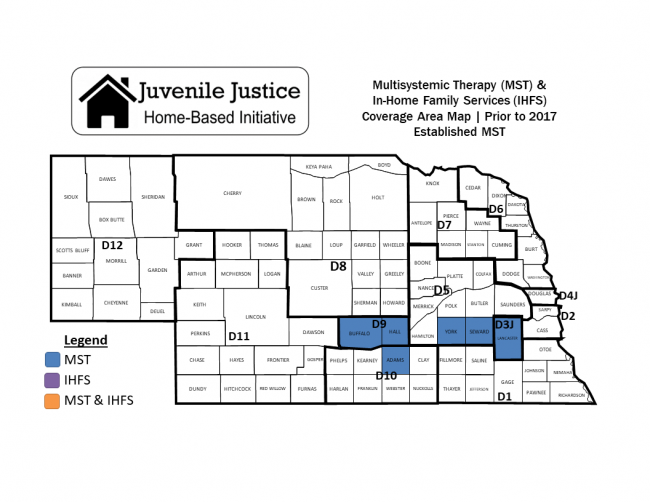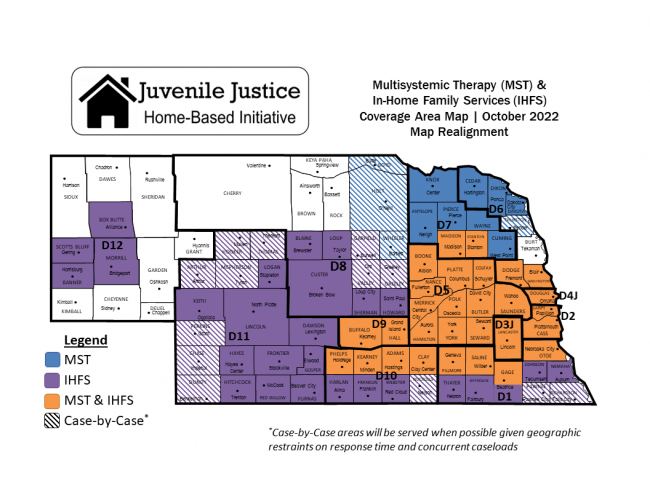Juvenile Justice Home-Based Initiative
A collaborative project—between the Administrative Office of the Courts and Probation and local foundations—aimed at reducing recidivism and the number of out-of-home placements for youth in the justice system across the state.
Overview:
A wide-range of research shows the benefits of serving youth on probation in their home environment. The best investment for the future of youth in the justice system is providing services that improve the quality of life for youth and their families while enhancing community safety. Further, the need for out-of-home placements, and the harm that comes from lasting family separation, is reduced when the system is able to leverage improvements in the home environment of the youth. However, effective home and community-based services have not historically been available in most Nebraska communities. Where services were available, they often lacked the capacity to meet the needs of all families in need of services. This reality led to an initiative to make more evidence-based community services available for youth who are not considered a danger to their communities.
Through the Juvenile Justice Home-Based Initiative, service access has increased to youth involved with juvenile probation, allowing more youth to remain in their homes and communities, and fewer youth to be placed out-of-home. Additionally, the selected programs boast outcomes alleviating issues resulting in delinquent behavior, thereby decreasing the probability of the youth returning to the juvenile justice system. Funding provided by local foundations make it possible to establish new, and expand on current, evidence-based services for justice-involved youth.
Models:
Multisystemic Therapy (MST) is an intensive family- and community-based treatment program that focuses on addressing all environmental systems that impact chronic and violent juveniles in the justice system -- their homes and families, schools and teachers, neighborhoods and friends. MST recognizes that each system plays a critical role in a youth's world and each system requires attention when effective change is needed to improve the quality of life for youth and their families. MST works with the toughest offenders ages 12 through 17 who have a very long history of arrests. MST outcomes include reducing out-of-home placements and re-arrest rates, as well as increasing parenting skills, improving family relations, improving school or vocational participation and achievement, increasing participation in pro-social activities, and creating a support network of friends, relatives, and neighbors to assist in maintaining changes.
Boys Town In-Home Family Services (IHFS), formerly known as Ecological In-Home Family Treatment (EIHFT), is a strength-focused home and community-based program designed to reduce risk that contributes to delinquent behavior and family dysfunction. Family Consultants work to enhance and improve youth and family functioning in the home and community and prevent the need for youth to be detained or placed in an out-of-home setting. Each family has an individualized service plan developed to include youth and family-driven goals that address the emotional, behavioral, social, educational and emotional needs of families. The services include a strong focus on family engagement, initial and ongoing assessment, individualized interventions, and case closure planning for long term outcomes. IHFS is designed to implement focused interventions and cognitive behavioral techniques to enhance youth skill development, such as social skills, problem-solving, and anger management skills. Family Consultants work with parents on evidence-based, behaviorally-oriented parenting practices to improve family functioning and stability in the home. Interventions also include development of informal and formal supports, linkage to community resources, and concrete services. The outcomes of these interventions are reduced truancy, substance abuse, curfew non-compliance, and other youth maladaptive behaviors.
Program Development:
Launching in April 2017, the Juvenile Justice Home-Based Initiative fosters partnerships between local probation offices and service providers to increase the statewide capacity of home-based services for justice-involved youth. At the time of the program’s launch, only six Nebraska counties were being served by juvenile-justice focused MST services.
coverage area prior to 2017:

coverage area 10/2022

Since that time, the scope and reach of the initiative has added IHFS in the program’s scope and grown the service area to now serve 82 counties in 2022. The most recent additions of IHFS services have improved access to services in previously underserved rural areas.
Resources:
Websites
- MST Services
- Boys Town IHFS
- Evidence-Based Practices
Videos
- Boys Town Services Overview
- Boys Town In-Home Family Services (IHFS)
- The Impact of MST
- Breaking the Cycle (Juvenile Justice)
- How Does MST Work?
- MST: Proven Results for Families at a Cost Savings to Communities
- Judge Steve Teske on the Impact of MST
Other
- MST
- Boys Town
For additional information contact:
Emily Schoenleber
Program Specialist, Juvenile Justice Home-Based Initiative
521 South 14th Street, Suite 500
Lincoln, NE 68508
Cell: (402) 326-5916
emily.schoenleber@nejudicial.gov

